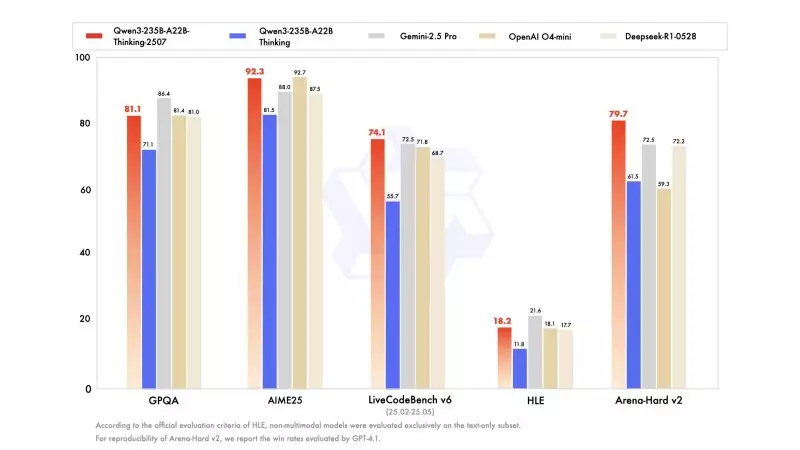In the rapidly evolving landscape of artificial intelligence, few recent developments have sent such a clear signal of transformative potential as Alibaba’s Qwen team unleashing an unprecedented wave of open-source models. What sets this apart is not just the volume of releases—four potent models in just a week—but the remarkable quality and performance benchmarks they have shattered. Among these, the flagship Qwen3-235B-A22B-Thinking-2507 stands out as a game-changer, challenging the dominance held by proprietary giants like OpenAI and Google.
This surge is not merely about ticking boxes on benchmarks; it signifies a fundamental shift in the AI industry’s trajectory. Alibaba’s strategic pivot toward highly specialized, performance-optimized models—rather than monolithic, all-in-one solutions—could redefine how enterprises and developers approach AI deployment. Instead of relying solely on API-controlled black boxes that restrict flexibility and ownership, Alibaba champions open licensing and local deployment options, thus empowering organizations with unprecedented control over their AI assets.
The implications are profound: in a landscape historically dominated by closed, proprietary models, Alibaba’s energetic push champions transparency, customization, and a democratized AI ecosystem. This is a critical response to growing concerns over data privacy, regulatory compliance, and the rising costs associated with API usage. The leadership’s emphasis on licensing under the permissive Apache 2.0 license further underscores their commitment to building a sustainable, open, and adaptable AI infrastructure—one that can be tailored to the needs of vast, diverse industries.
Unparalleled Performance: Benchmark Triumphs and Tactical Precision
Examining the performance metrics, Alibaba’s latest models are more than just competitive—they are often leading. Qwen3-Thinking-2507, with its capacity for complex reasoning and chains of thought, boasts a high score of 92.3 on the AIME25 benchmark, just shy of OpenAI’s o4-mini, yet surpassing many competitors. Its standout result on the LiveCodeBench v6 (74.1) cements its position as a top contender in coding and logical problem-solving. Moreover, its near-parity in the GPQA benchmark demonstrates its versatility in handling high-level, graduate-style questions, proving that this model isn’t just a technical feat but also a practical resource for knowledge-intensive tasks.
What does this carry for the wider AI ecosystem? It signifies that open-source models no longer need to lag behind proprietary counterparts in performance. Instead, they are closing the gap, and in many scenarios, outperforming them. This democratization of high-caliber models creates fertile ground for innovation beyond the constraints of API architectures, pushing forward an era in which organizations can fine-tune, adapt, and deploy advanced AI capabilities entirely on their terms.
This shift calls into question the traditional industry narrative that only large corporations with immense resources can develop state-of-the-art AI. Alibaba’s bold move to release such powerful models openly challenges that paradigm, emphasizing that excellence in AI can stem from open collaboration and community-driven development.
Strategic Innovation: Specialization and Technical Transparency
Alibaba’s strategic release of segmented models reflects a nuanced understanding of AI deployment demands. Rather than a single, all-encompassing model, they are developing dedicated specialized models for reasoning, coding, and translation—each finely tuned for its respective domain. This approach enables enhanced performance, fewer compromises, and more targeted optimizations.
Furthermore, their transparency and choice of licensing pave the way for enterprise adoption at scale. With Apache 2.0, organizations can confidently deploy these models into sensitive environments, modify them to suit their unique workflows, and even integrate them into proprietary systems without the typical licensing restrictions. This level of control is particularly appealing for sectors like finance, healthcare, and defense, where data privacy and compliance are paramount.
Alibaba’s emphasis on community-integration tools—such as Hugging Face, ModelScope, and OpenAI-compatible APIs—further accelerates adoption, bridging the gap between cutting-edge research and practical, scalable solutions. By offering models capable of long context windows, robust multilingual translation, and specialized coding workflows, the Qwen series becomes an all-encompassing toolkit that broadens the horizon for enterprise AI applications.
The Road Ahead: Open-Source as a Catalyst for AI Democratization
What does the rise of Alibaba’s Qwen models mean for the global AI race? It’s a clear declaration that open-source intelligence is not merely a supplementary activity but a central pillar in building the future AI infrastructure. As major players scramble to lock users into API ecosystems, Alibaba’s approach disrupts that narrative—favoring openness, adaptability, and full ownership.
The potential for these models to catalyze innovation is immense. Startups, research institutions, and established corporations now have access to high-performance, customizable AI models that they can own outright. This fosters a more vibrant competitive landscape, where solutions are tailored, costs are controlled, and innovation isn’t locked behind corporate walls.
Alibaba’s strategic, high-caliber open-source releases mark a pivotal moment in AI history. By prioritizing transparency, performance, and enterprise-readiness, they challenge the entrenched paradigms and pave the way for a more democratized, flexible, and powerful AI future. This isn’t just a milestone for Alibaba or the Chinese tech ecosystem—it’s a clarion call for a new era of open, accessible, and truly transformative artificial intelligence.

